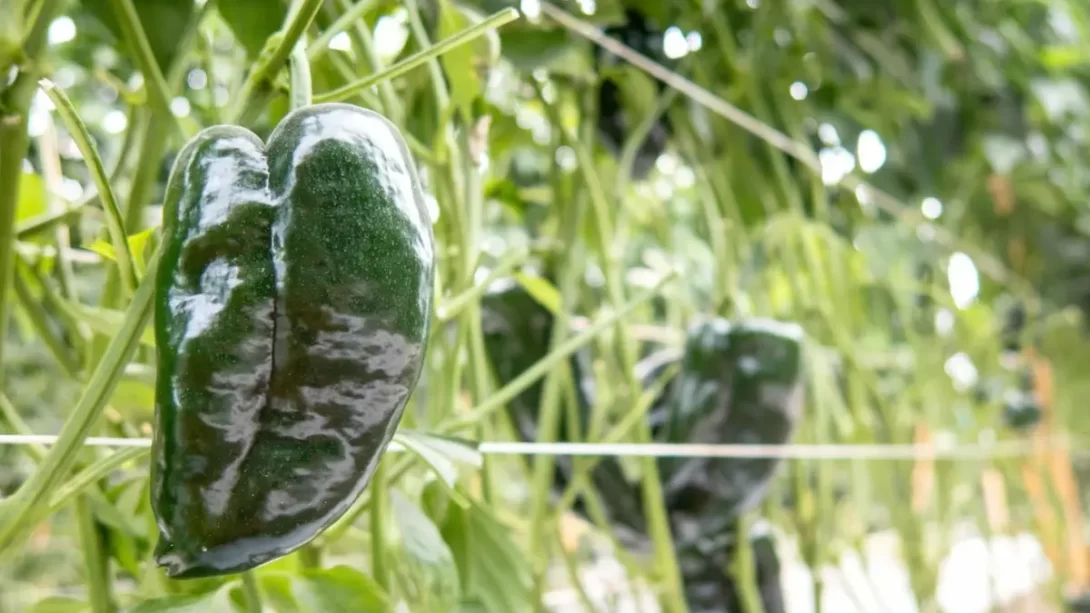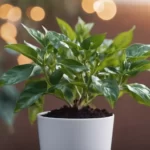Poblano peppers, known for their mild heat and rich flavor, are a staple in Mexican cuisine and beyond. From stuffing for chiles rellenos to a spicy kick in sauces, their versatility is unmatched. However, poblanos can spoil quickly if not stored properly. This guide provides several effective methods for preserving poblano peppers, extending their shelf life and enhancing your culinary repertoire.
Selecting and Preparing Poblano Peppers for Preservation
The key to successful preservation starts with selecting the right peppers. Look for poblanos that are firm, glossy, and free of blemishes or soft spots. Freshness is crucial, so use peppers that are recently harvested. Before preserving, wash the peppers thoroughly under running water to remove any dirt or pesticides. Pat them dry to ensure there’s no excess moisture, as this can lead to spoilage during preservation.
Freezing Poblano Peppers
Freezing is one of the simplest and most effective ways to preserve poblano peppers. You can freeze them whole, sliced, or roasted, depending on how you plan to use them later. To freeze whole or sliced poblanos, cut off the stems, remove the seeds, and slice them if desired. Blanch the peppers in boiling water for a few minutes, then plunge them into ice water. This stops the cooking process and preserves their vibrant color. Drain the peppers, pat dry, and spread them out on a baking sheet to freeze individually. Once frozen, transfer them to airtight bags or containers. This method prevents the peppers from sticking together, making it easy to use the desired amount in future recipes.
Drying Poblano Peppers
Drying poblano peppers is a traditional method that brings out their smoky flavor. There are two main ways to dry poblanos: air-drying and oven-drying. For air-drying, string the peppers by their stems and hang them in a dry, well-ventilated area away from direct sunlight. It can take several weeks for the peppers to dry completely. For a quicker method, oven-dry the peppers. Cut them in half, remove the stems and seeds, and place them on a baking sheet in a single layer. Dry them in an oven set to the lowest possible temperature, keeping the door slightly ajar to allow moisture to escape. Check regularly and turn them occasionally until they’re completely dried. Store dried poblanos in an airtight container in a cool, dark place.
Pickling Poblano Peppers
Pickling is an excellent way to preserve poblano peppers while adding a tangy flavor. To pickle poblanos, start by slicing the peppers into rings or strips after removing the seeds and stems. Prepare a pickling solution with equal parts water and vinegar, adding salt and sugar to taste. You can also include spices like garlic, peppercorns, or bay leaves for extra flavor. Bring the solution to a boil, then pour it over the peppers packed into sterilized jars. Ensure the peppers are completely submerged in the liquid. Seal the jars and store them in the refrigerator. The pickled poblanos will be ready to eat in a few days and can last several months in the fridge.
Roasting and Preserving Poblano Peppers
Roasting enhances the flavor of poblano peppers, and preserving them in this form adds a smoky depth to dishes. Roast the peppers over an open flame or under a broiler until the skin is charred. Place them in a covered bowl or plastic bag to steam for a few minutes, then peel off the skin. You can preserve the roasted peppers in two ways: storing in oil or freezing. For storing in oil, place the peeled, deseeded peppers in a jar and cover them completely with olive oil. Keep the jar refrigerated. Alternatively, freeze the roasted peppers on a baking sheet before transferring them to airtight containers or freezer bags.
Canning Poblano Peppers
Canning is another effective method for long-term preservation of poblano peppers. Start by sterilizing your jars and lids. Prepare the peppers by slicing or keeping them whole, depending on your preference. To can safely, it’s important to maintain the right pH balance, so use a vinegar-based pickling solution or a pressure canner for plain peppers. Fill the jars with peppers and cover them with the boiling pickling liquid or hot water, leaving some headspace. Seal the jars and process them in a water bath canner or a pressure canner according to safe canning practices. Properly canned poblano peppers can be stored at room temperature for up to a year.
Making Poblano Pepper Powder
Poblano pepper powder is a flavorful addition to your spice collection, offering a mild heat with a smoky note. To make it, start with fully dried poblano peppers. Remove the stems and seeds, and break the peppers into smaller pieces. Using a spice grinder or a high-powered blender, grind the pieces into a fine powder. Sift the powder to remove any large chunks, and grind these again until everything is a consistent texture. Store the poblano powder in an airtight container in a cool, dark place. It can be used in rubs, marinades, or to season dishes where you desire a gentle heat with a rich flavor.
Conclusion
Preserving poblano peppers is a wonderful way to enjoy their unique flavor year-round. Each method – freezing, drying, pickling, roasting and storing in oil, canning, and making pepper powder – offers different uses and flavors. Freezing provides versatility in cooking, while drying and making pepper powder bring out a deeper, smokier flavor. Pickling adds a tangy twist, and canning ensures you have poblanos on hand for any recipe. Roasting and preserving in oil combine the convenience of ready-to-use peppers with the enhancement of their natural flavors.
Experimenting with these different preservation techniques will not only extend the shelf life of your poblano peppers but also expand your culinary possibilities. Whether adding them to a stew, spicing up a sauce, or garnishing a salad, these preserved poblanos will bring a unique and delicious dimension to your dishes. So next time you have a surplus of poblano peppers, try these preservation methods and enjoy their flavors all year long.



